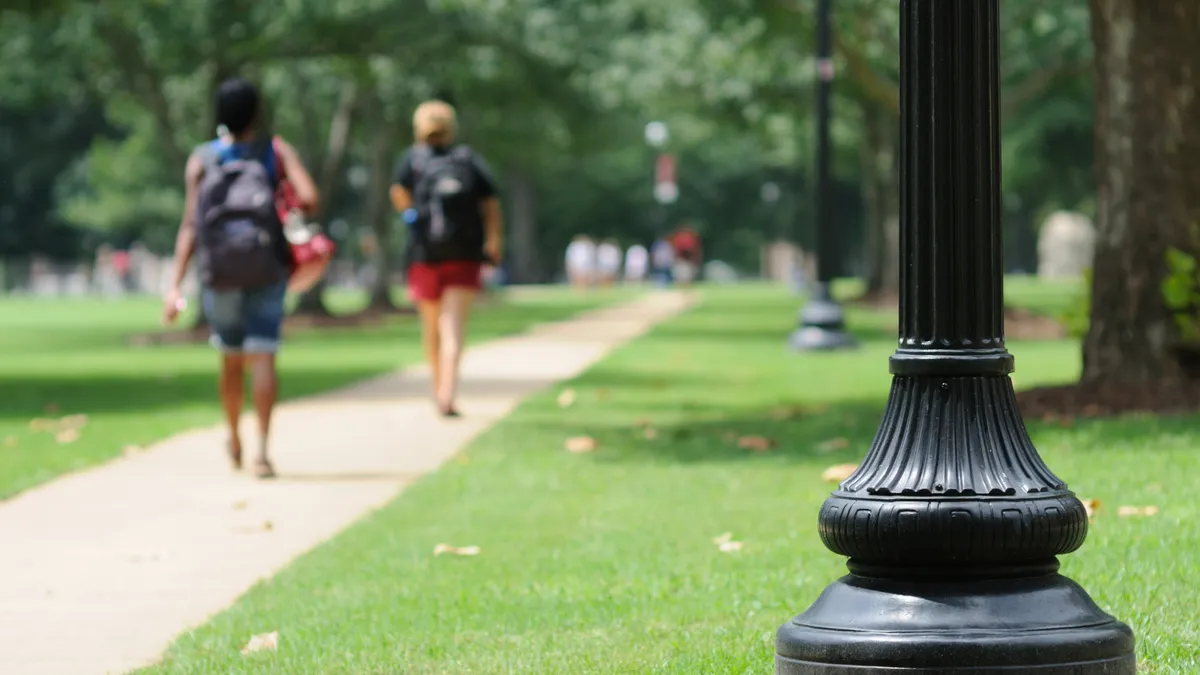As the novel coronavirus continues to disrupt college operations — forcing campuses to shut down and marring their enrollment projections for the coming academic year — a decision announced by the National Association for College Admission Counseling (NACAC) last week went largely unnoticed.
NACAC, which in September stripped three key provisions from its ethics code, moved this month to "recast" the code. No longer would it be the expected playbook for its member institutions, but rather "a statement of best practices" that would merely explain the association's values for admissions professionals, NACAC President Jayne Caflin Fonash wrote in a letter posted on the organization's website.
This change, which has not yet been approved by NACAC's larger governing body, was meant to avoid further scrutiny by the U.S. Department of Justice, Joyce Smith, NACAC's CEO, told Education Dive.
The department had investigated the group and determined that the three statements NACAC pulled from its Code of Ethics and Professional Practices, were potential antitrust law violations.
Removing those rules allowed college officials to recruit students after May 1, which has historically served as the deadline by which students pick their college and colleges stop trying to recruit them. However, the date has increasingly become less relevant in the eyes of admissions officers as some institutions struggle to fill their classes. Observers feared striking the provisions would actively encourage colleges to poach students after May 1.
With the coronavirus, and the respiratory disease it causes, COVID-19, throwing the country into economic turmoil, the pool of students colleges are battling over will likely become much shallower. NACAC removing itself as an authority on the matter may complicate recruitment processes in the coming months, when institutions will be facing unprecedented enrollment challenges.
'It will get very aggressive'
Rather than using cutthroat recruitment tactics, however, colleges for now are more focused on helping students and wooing admitted ones to stem a potential downturn in enrollment due to the coronavirus, Madeleine Rhyneer, vice president of consulting services and dean of enrollment management at EAB, said in an interview with Education Dive.
That could change, though.
"When life returns a bit more to normal after so much uncertainty coronavirus has brought, I think it's likely it will get very aggressive," Rhyneer said.
As the coronavirus spread across the U.S., colleges began to shift classes online, some directing campus dormitories to be vacated. Officials have confirmed more than 196,000 cases of COVID-19 worldwide, with more than 5,800 in the U.S., as of Tuesday afternoon, according to data gathered by Johns Hopkins University.
Colleges typically would be getting ready to host grand recruitment events for students who have been offered admission. These large-scale affairs attempt to show off the college to students and secure their acceptance.
Because they can't hold on-campus fairs, admissions officials have tried to use virtual platforms to promote the same feeling of excitement that the events generate, Rhyneer said.
Without the events, administrators' time has been freed up to reach out to students directly via email or even with a phone call, although younger generations do not prefer the latter method, she said. Other colleges are working on campaigns to send students college-related swag that they can share on social media, Rhyneer said.
Administrators are trying to be innovative because of the potential enrollment losses they face.
Coronavirus has closed down many K-12 school districts, meaning incoming students likely will have difficulty finishing out their senior year, completing their AP and similar year-end exams, and touching base with counselors about their college decisions.
'A learning experience'
Economists predict that the situation unfolding as a result of the outbreaks would trigger a major recession as the virus has halted activity in several large industries. This would, in turn, affect families' ability to send their children to college, Rhyneer said.
International students would be particularly affected. The U.S. has instituted bans on travel from certain countries, such as China, Iran and European nations, which could prevent students from visiting campuses. Some international sites for admissions testing, like the Toefl English proficiency exam, have also closed.
Colleges have relied on international students, who tend to pay full tuition, to help balance their budgets and offset costs for domestic students, partially in light of blunted state funding.
All these factors could increase competition among institutions, NACAC's Smith said.
NACAC officials feared that removing the initial provisions from its ethics code would make college recruitment the "wild, wild West," Smith said.
Although she recognizes the chaotic environment the virus has caused, she said NACAC could "no longer police" these matters. The association risked lawsuits from institutions if it continued to try to limit recruiting, she added, noting that NACAC already spent $1 million in legal fees fighting the Justice Department.
"Things are changing daily, and the world as we know it is changing," Smith said. "We're all suffering through the same thing and figuring out what we can do or cannot do, and it's a learning experience. I just encourage people to be patient."



















